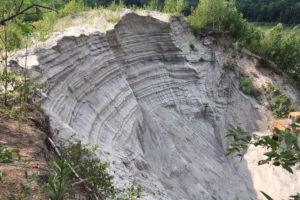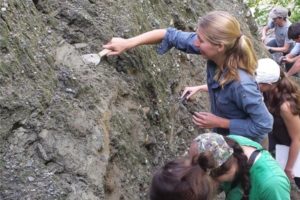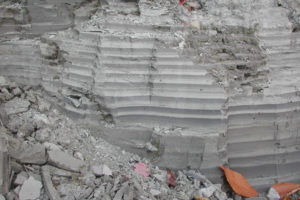Glacial Geology of Northern Vermont

Instructors: Stephen Wright
POSTPONED to August 29-30 | $265
Course size: 10 students
Adaptations and Expectations for our 2020 BioU Programs as of June 11, 2020:
- We will no longer be serving food or drinks this season. We ask that you please bring your own food. We will be issuing a $30 refund to all those already registered who opted for meals.
- Courses have been adapted to take place largely in the field or in our event tent, but there may be 60-90 minutes of lecture per day in our large indoor space.
- Some courses have been rescheduled so that there are no longer two courses happening simultaneously on the premises.
- Course size has been reduced to 10 participants or fewer.
- If you will be traveling from out of state, please contact us before the course to evaluate the safety of your participation.
In order to keep you, our staff, and our community safe, NBNC is adhering to strict safety protocols based on CDC and VT Department of Health guidelines. We’re in this together, so here’s what you can expect from us, and what we ask of you as a participant of an in-person NBNC program:
What you can expect of us:
- Breathing Room: We’ve capped all our programs at 10 participants or fewer, and designed them to take place outdoors, with the exceptions of bathroom access, thunderstorm contingencies, and (in some cases) short-term use of the community room.
- Cleanliness: All potential shared surfaces will have been sanitized before and after each program. No two programs will share the same indoor space (including bathrooms) on any given day. We’ll start each program with a briefing to ensure everyone is on the same page regarding behavior, expectations, masks, distancing, etc.
- Professionalism: We have completed state-mandated safety trainings, established a staff/board safety committee and a COVID-19 Task Force, and are adhering to strict workplace guidelines to make sure we are taking appropriate measures to make NBNC a safe place to work, learn, and play.
- Honesty: Our instructors will be following state safety guidelines, and complete health screenings prior to each program to ensure a healthy staff and a safe space for each program.
- Respect: Our staff and instructors will wear a mask at all times (inside and outside), and maintain at least 6’ distance from all other people throughout all programs.
- Transparency: We want to make sure you are comfortable. If you’ve got questions or concerns about our programs and policies, please reach out to us at [email protected].
What we ask of you:
- Honesty: Do not come to the program if you are feeling ill in any way. You’ll be asked to sign a waiver and health screening document upon arrival acknowledging that you are symptom-free and haven’t been at high risk of exposure to the coronavirus recently. If you develop COVID-like symptoms within 14 days after the program, notify NBNC immediately.
- Respect: Wear a mask at all times (inside and outside), during NBNC programs. Maintain at least 6’ distance from all other people, including staff, during the program. Follow all safety guidelines explained by our staff.
- Cleanliness: Sanitize bathrooms and other common surfaces before and after use, according to our guidelines posted in each space. Bring and use hand sanitizer, and wash your hands thoroughly.
- Flexibility: Please understand that programs may be cancelled on very short notice, and that our protocols are continually adapting to best available science and expert recommendations.
Thank you for your support in keeping our community safe!
T
his class uses multiple field sites to demonstrate how we understand key aspects of northern Vermont’s glacial geologic history. In particular, we will observe a variety of landforms and sediments created by glaciers and focus on the different geologic processes that were active when the landforms and sediments formed. We will then use our understanding of how these landforms and sediments formed to interpret the changing environments existing in northern Vermont during the last 25,000 years.
Course Goal
- To learn how field observations of sediments and landforms are used to interpret the glacial geology of the region.
Course Objectives
- To recognize the different types of sediments and landforms formed in glacial environments
- To understand the processes taking place as those sediments and landforms are created
- To interpret the changing environments existing in northern Vermont from peak glaciation to ice sheet retreat
About the Instructor(s)
Stephen Wright is a Senior Lecturer in the Geology Department at the University of Vermont. His current research utilizes extensive field work to further our understanding of the glacial history of northern Vermont. This work includes understanding the dynamics of ice flow and water flow within the big ice sheet that once covered Vermont and the histories of the many glacial lakes dammed by that ice sheet. During the summer months he frequently maps for the Vermont Geological Survey.
Meals
UPDATE 6/11/2020: Due to COVID-19 concerns, meals and beverages will not be provided this year. We ask that you please bring your own food. Students already registered who opted for meals will receive a $30 refund.
Required Materials and Recommended Reading
Course Readings
- Books
- Bennet, M.R. and Glasser, N.F., First or Second Edition, “Glacial Geology: Ice Sheets and Landforms”
- Articles and Field Trip Guides
- Larsen, F.D., 1987, History of glacial lakes in the Dog River valley, central Vermont; in Westerman, D.S., ed., New England Intercollegiate Geological Conference Guidebook, p. 214–236.
- Larsen, F.D., Wright, S.F., Springston, G.E., Dunn, R.K., 2003, Glacial, late-glacial, and post-glacial history of central Vermont; Guidebook for the 66th Annual Meeting of the Northeast Friends of the Pleistocene, 62 p.
- Wright, S.F., 2015, Late Wisconsin ice sheet flow across northern and central Vermont, USA; Quaternary Science Reviews, Vol 129: 216–228.
- Wright, S.F., 2018, Surficial Geology and Hydrology of the Bolton Mountain 7.5-Minute Quadrangle, Vermont; Vermont Geological Survey Open File Maps and Report.
- Wright, S.F., 2019, Glacial Geology of the Miller Brook Valley, Stowe, Vermont: A Head to Toe Traverse; New England Intercollegiate Geological Conference Guidebook, p. B3-1–B3-22.
- Wright, S.F., Springston, G.E., and Van Hoesen, J.G., 2015, Ice retreat and readvance across the Green Mountain Foothills: Bolton and Jericho, Vermont; New York State Geological Association Guidebook Vol. 87: 327–352.
Timing
Course begins 9 AM on Saturday at North Branch Nature Center. Saturday's session will end around 5 pm. Course begins on Sunday at a time of the instructor's choosing. Course concludes by 5 PM on Sunday.
Academic Credit / Professional Development
This course qualifies for 1 graduate-level science credit for an additional $150 course fee. All BioU courses are accredited by Castleton University. It is the student’s responsibility to ensure that home institutions will accept the credit. Participants pursuing academic credit will be required to complete an additional assignment above and beyond the course hours, including literature review, reflective writing, or a field-based project.
This course qualifies for 20 hours of professional development hours and continuing education units. Certificates of completion are provided at the conclusion of the course.
Cancellation Policy
While we realize that unexpected circumstances arise that are out of our control, North Branch Nature Center cannot guarantee refunds for registrations cancelled within 30 days of the course. If a cancellation occurs within this window, NBNC will attempt to fill the space from our wait list and provide a full refund. If the course needs to be cancelled within 30 days of the program, NBNC will provide a full refund. If you need to cancel due to concerns related to COVID-19, a full refund will be provided up to 48 hours before the course.
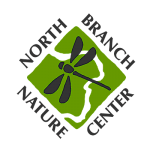
713 Elm Street
Montpelier, Vermont 05602
(802) 229-6206
Hours: Center Open Monday-Friday 9-4
Trails Open 24/7
